Steve Flowers: December’s election is all about Roy Moore
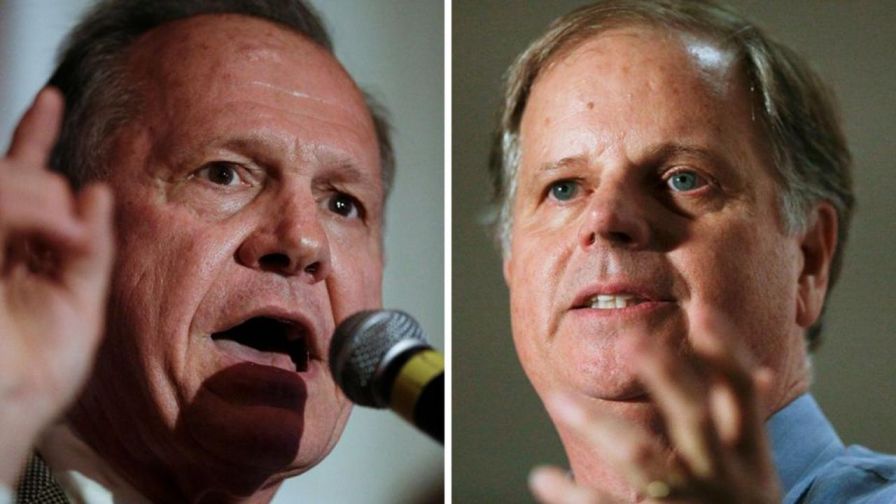
The big question in the Senate race is will allegations against Roy Moore and his purported propensities forty-years ago cause him to lose. We will soon see. The election is less than three weeks away. The book on Moore is easy to read. The polls have consistently revealed that 30 percent of voters like him and 70 percent do not like him. He is a polarizing figure and well known. However, the real poll that counts is the one on Election Day. The reason that he won the GOP primary was that his people showed up to vote for him. His followers are more ardent, fervent, and quite frankly older. Older voters are a lot more likely to vote than younger voters. Therefore, his 30 percent becomes more accentuated and rises to 51 percent. If he wins on December 12, it will be because of turnout. His 30 percent will turn out. The Democrat, Doug Jones really has no following. It is all about Moore. The votes that Jones gets will be the Democratic base coupled with those disenchanted with Moore, who dislike him enough to go vote for a Democrat for a U.S. Senate seat. As George Wallace use to say, “More people vote against someone than for someone.” My guess is that Moore’s 30 percent is unswayed by the Washington Post revelations. They look upon it as a scurrilous last minute political attack by the Washington establishment and left wing media. Some suggexst that it may have energized his base. They feel that he has been unduly attacked. They simply dismiss the allegations as untrue and fabricated and are suspicious of the timing. They ask why did these accusers came forward four weeks before the election and not years ago. The wall around the 30 percent dedicated to Roy Moore appears impregnable. Turnout will be the key to this election the same way it was in the primary. The 75-year-old deacon of the First Baptist Church of Gadsden is going to vote. The question is does the soccer mom in Homewood go vote. Roy Moore’s fate is not the only one to be decided in December. The fate of Business Council lobbyist, Billy Canary, may also be decided in December. BCA’s leadership changes at their annual meeting on December 1. Perry Hand of Baldwin County will take the reins of the once powerful organization. Hand is a very well regarded gentleman in the private and public sector of Alabama. He is an engineer by profession and a principal in Volkert Engineering. He has been an outstanding businessman, road builder, state senator, and Secretary of State. Canary has basically made the Business Council a joke among powerful legislators. He is so disliked and disrespected that he is thought of as a clown or caricature. In visiting with the majority of Republican senators, they say he has never even said “hi” to them. He walks the halls occasionally with a haughty, arrogant air and snubs not only all nine of the Democrats in the state senate as well as the 26 Republicans. I could not find one state senator who would say anything good about the New Yorker. They snicker and say that no bill will pass my committee if he is for it. State Senator, Slade Blackwell, a respected businessman and staunch Republican from a silk stocking Jefferson County area said Canary actually does the BCA more harm than good. He said the BCA members would be better served to give campaign money directly to candidates than have it tainted by Canary. Blackwell, who also chairs the Senate Banking and Insurance Committee, has only spoken to Canary one time in seven years. Dr. Paul Bussman, who is very independent and represents Cullman and parts of Northwest Alabama as a Republican state senator, said that Canary threatened him so abrasively over a piece of legislation in his first term that when he got home he wrote a check for $26,000, the amount the BCA had given his campaign, and sent it back to Canary with the message to not ever talk with him again. The well liked, mild mannered, pro-business state senator, Shay Shelnut, said Canary has never spoken to him in his entire five years in the senate. This is the prevalent theme among most Republican members of the senate. The most important senator, U.S. Senator Richard Shelby, has barred Canary from his office. See you next week. ••• Steve Flowers is Alabama’s leading political columnist. His weekly column appears in over 60 Alabama newspapers. He served 16 years in the state legislature. Steve may be reached at www.steveflowers.us.
Election Day for Republican nominee for U.S. Senate is here as are many predictions
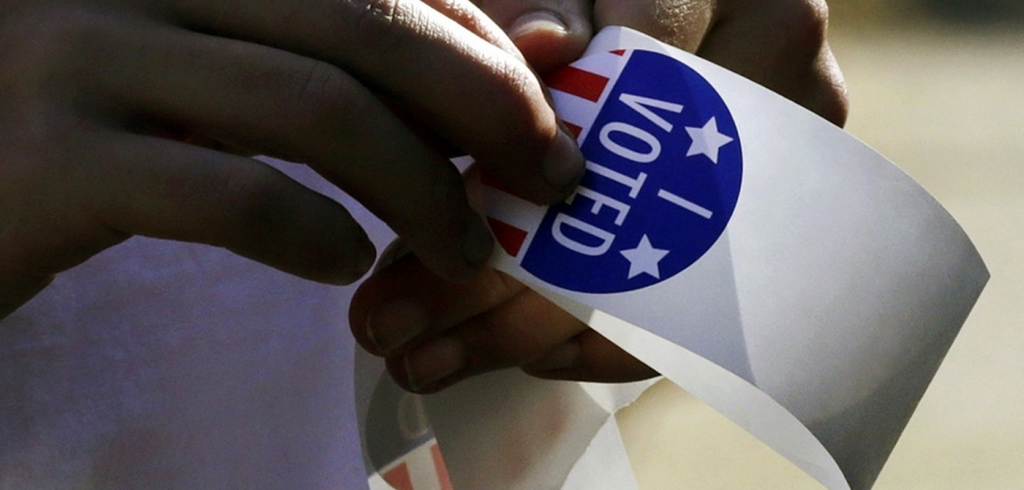
Alabama voters will decide on today, Tuesday Sept. 26, 2017, who will be the Republican nominee for the U.S. Senate vacated by Jeff Sessions when he assumed the U.S. Attorney General position in February. It’s been a brutal run-off election between former Ala. Chief Justice Roy Moore and appointed Sen. Luther Strange. My prediction: Judge Moore wins 58 to 42. Why: The Senate Leadership fund and outside supporters of Strange went too far in their attacks of Moore and his wife. You can say a lot of things about Moore, but to compare him to Nancy Pelosi was a stretch. That wasn’t helping Strange. What could have helped Strange is if those supporting him had talked about his long conservative record, supporting Second Amendment rights, fighting the EPA, fighting for consumers. Voters could have used something to lessen the blow of the Bentley appointment that hovered over Strange’s incumbency like the dirt cloud that followed Pig Pen in Charlie Brown. Only hours left until the polls close at 7:00 p.m. and in the hours that follow, we’ll know who’s predictions were right and who’s dollars and endorsements mattered most to voters.
Roy Moore announces election day schedule
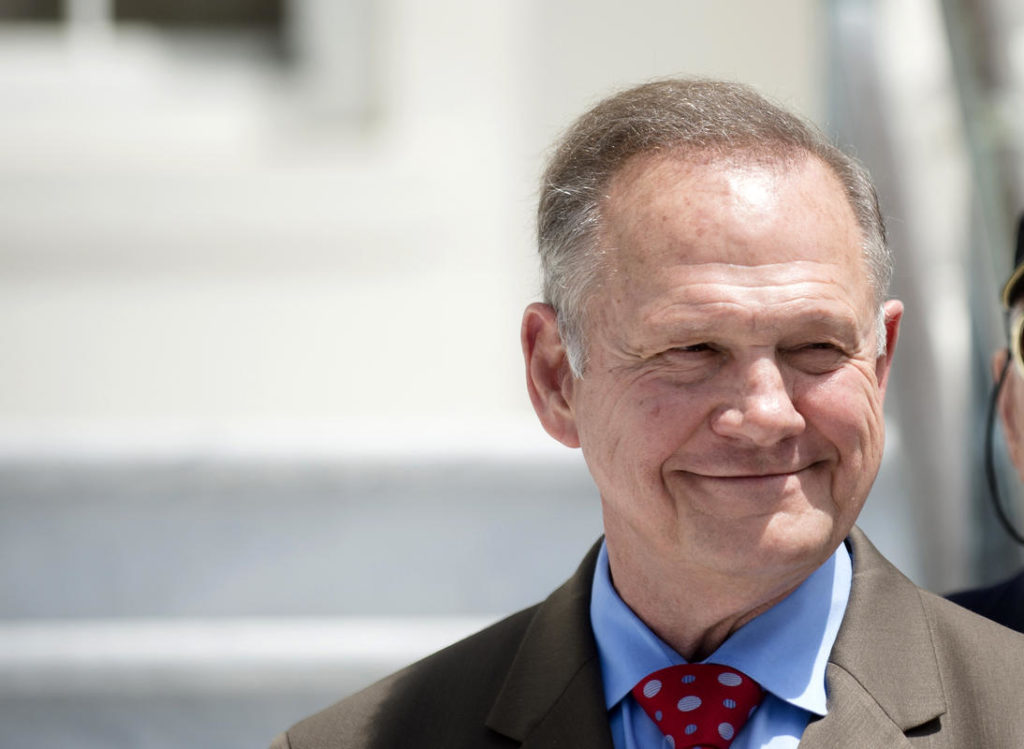
Yellowhammer State Republicans will head to the polls on Tuesday to cast their ballots for either former Alabama Chief Justice Roy Moore or appointed Sen. Luther Strange in the state’s GOP primary runoff election. On Monday, the Judge Roy Moore for Senate Campaign announced Moore’s election day schedule: 10:00 a.m. Judge Moore and Kayla will participate in their traditional horseback ride to the polls. Location: Gallant Fire Hall 9090 Gallant Road Gallant, AL 35972 7:00 p.m. Judge Moore and Kayla will join family and supporters at the RSA Activity Center in Montgomery for the Judge Roy Moore for U.S Senate Victory Party. Location: RSA Activity Center 201 Dexter Ave. Montgomery, AL 36104 Victory Party will be open to credentialed press. Doors will open at 4:00 p.m. For press credentials contact Katie Frost.
Trending story that Hillary Clinton won just 57 counties is untrue
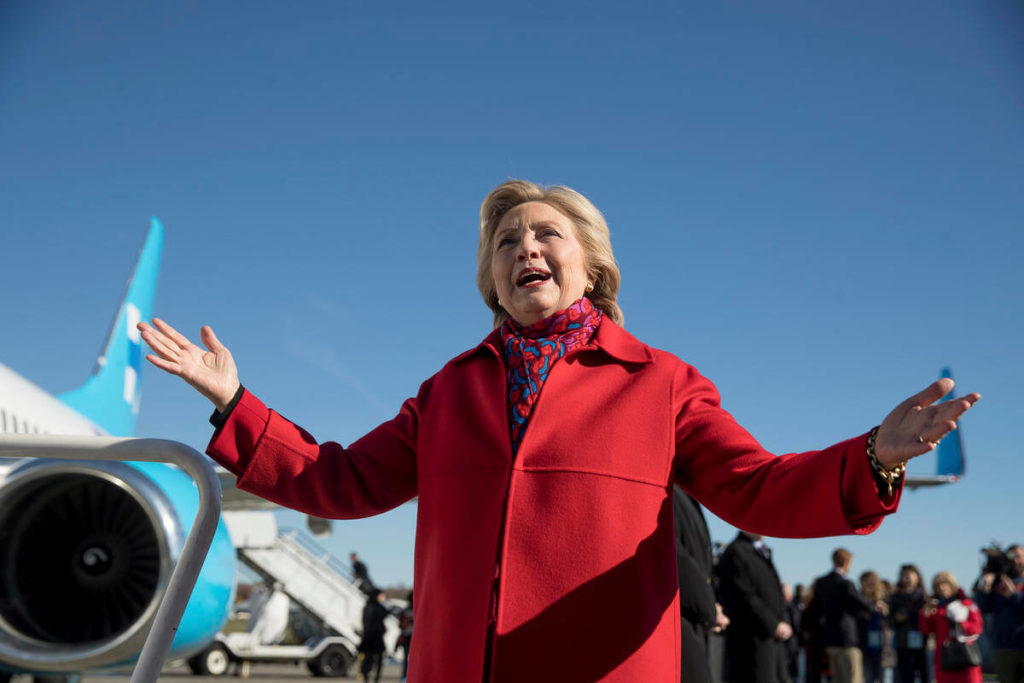
A trending story that claims Hillary Clinton won a total of 57 counties in the presidential election is untrue. The Associated Press finds that Clinton won 487 counties nationwide, compared with 2,626 for President-elect Donald Trump. The story appeared on several viral content sites that cater to some of Trump’s supporters. It also falsely claimed that Clinton outpaced Trump by more than 2 million votes in the five counties that comprise New York City, which the story said accounted for the entirety of her lead in the national popular vote. An AP count finds that Clinton beat Trump by roughly 1.5 million votes in New York City. Nationwide, Clinton holds a popular vote lead of more than 2 million. The AP considers parishes in Louisiana as counties in election tallies. Washington, D.C., and Alaska have a single statewide reporting unit. Virginia’s count includes 95 counties and 38 independent cities. Republished with permission of The Associated Press.
Donald Trump is elected president in historic upset
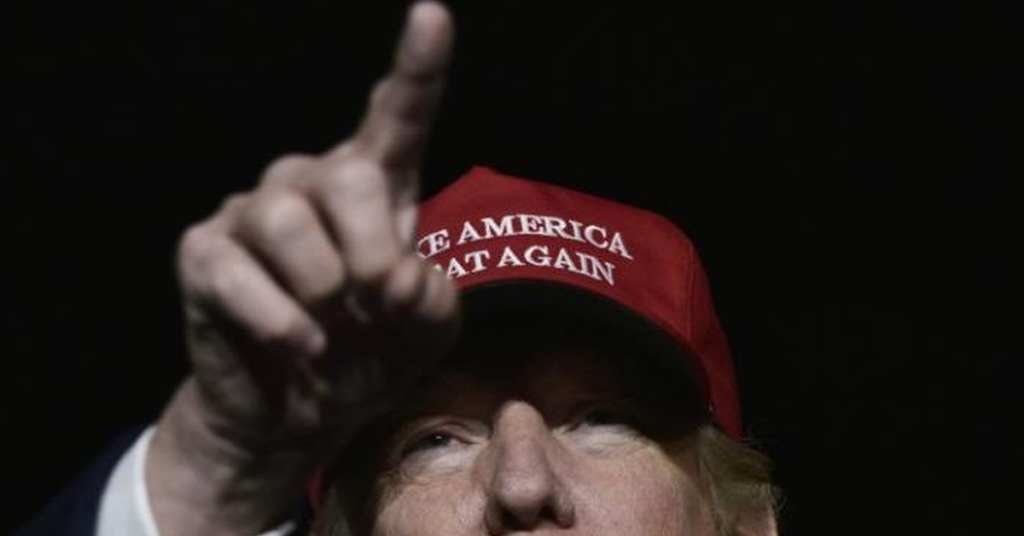
Republican Donald Trump pulled off a historic upset Tuesday when he was elected the 45th president of the United States of America. The billionaire businessman, who never before held elected office, caused a political earthquake when he crossed the 270 electoral vote threshold at 2:31 a.m. ET, stunning pollsters, politicos, and financial markets across the globe. Taking the stage in the early hours of the morning to make an acceptance speech, Trump said Clinton had called him to offer her congratulations and to concede the race. “Now it’s time for America to bind the wounds of division and get together,” he told supporters in the New York City crowd. “It is time for us to come together as one united people. I pledge to every citizen of our land that I will be president for all Americans.” Trump’s victory defied late polls showing his Democratic opponent Hillary Clinton with a modest, albeit persistent, edge. It also brought uncertainty to the world’s financial markets, with the Dow Jones industrial average falling as much as 500 points in after-hours trading. More than 110 million votes had been counted in the presidential race by 2:30 a.m. ET, with millions more outstanding.
Martha Roby narrowly wins re-election to fourth Congressional term
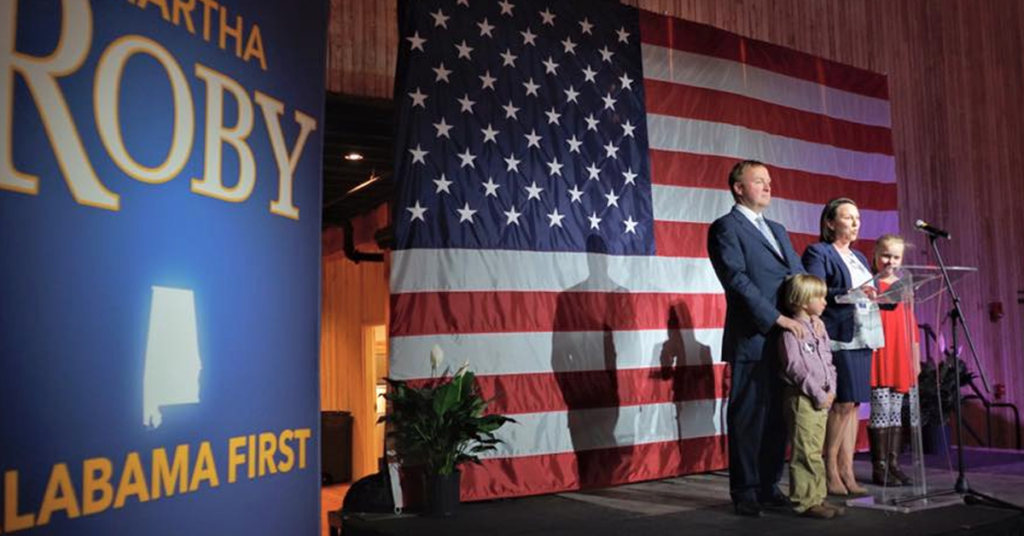
Alabama’s 2nd Congressional District re-elected Martha Roby to the U.S. House of Representatives Tuesday. The Montgomery Republican narrowly defeated Democratic challenger Nathan Mathis 46-43 percent. Roby faced a tougher than initially anticipated Election Day following backlash from her October withdrawl of support from Republican Presidential nominee Donald Trump in light of the derogatory comments he made about women over a decade ago. She will return to the House for a fourth term, where she has vowed to keep fighting on the issues that matter to the 2nd District. “I’m grateful for the opportunity to continue serving in Congress and carry on our work on some important priorities,” Roby said following her victory. “Over the last six years, I have fought hard on behalf of this district. I’ve fought on behalf of veterans to expose corruption at the VA and improve care. I’ve fought on behalf of farmers to deliver more sustainable agriculture policy. I’ve even fought my own party leadership when it came to cuts that threatened Maxwell Air Force Base and Fort Rucker. “There’s a lot more fight where that came from, and I’m eager to get back to work.” Though the results of the Presidential election are not yet known, Roby vowed to keep her focus on the issues that matter to Alabamians. Roby continued, “Right now, we don’t know whether conservatives will be playing offense or defense with the White House. No matter who ultimately wins the presidency, my focus will remain working hard to advance conservative values and solve problems on behalf of the people I represent. “One takeaway from this election I want to press with Republican leadership is how so many working people feel marginalized in a country where the outcomes seem predetermined and the deck is stacked against them. Whether it is trade or immigration or tax policy, we need to be communicating how our plans on the issues work to benefit the American worker. We talk a lot about how conservative policies will help the person that owns the factory, but we need to spend more time explaining how they help the men and women working inside it. “I’m eager to carry that message back to Washington.”
Donald Trump wins big in Alabama
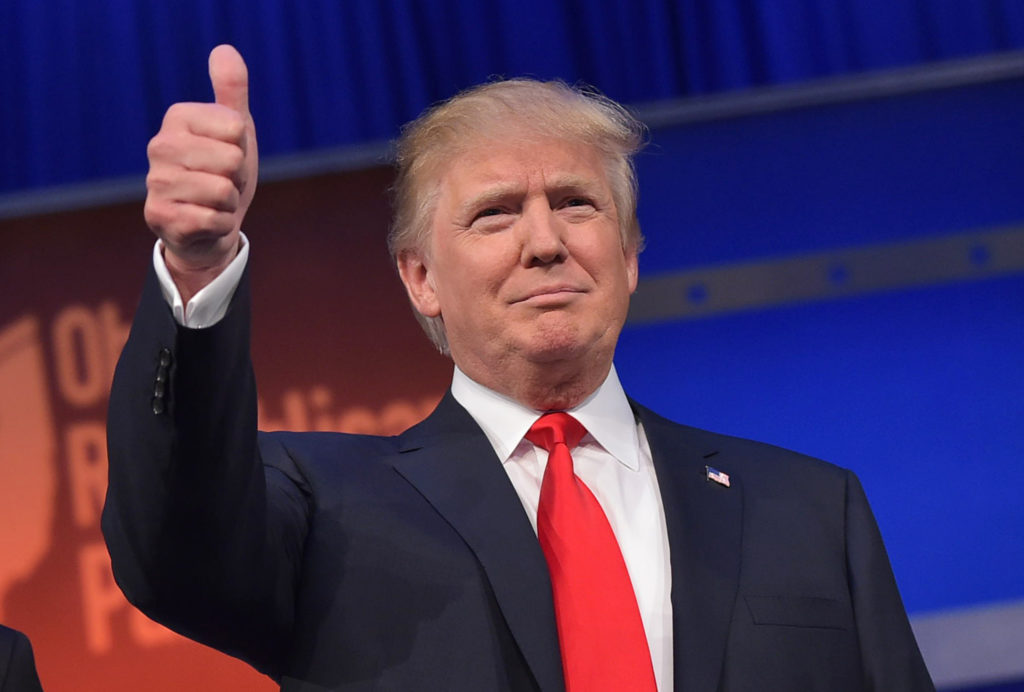
Shocking absolutely no one, Republican Donald Trump took home a decisive victory in the Yellowhammer State on Tuesday night over Democrat Hillary Clinton. Trump was heavily favored to win the state, which hasn’t been won by a Democrat since President Jimmy Carter in 1976. Trump was called the victor with 63 percent of the vote, compared to 36 percent for Clinton. Trump therefore takes all nine of Alabama’s Electoral College votes.
Hillary Clinton casts her ballot: ‘It is the most humbling feeling’
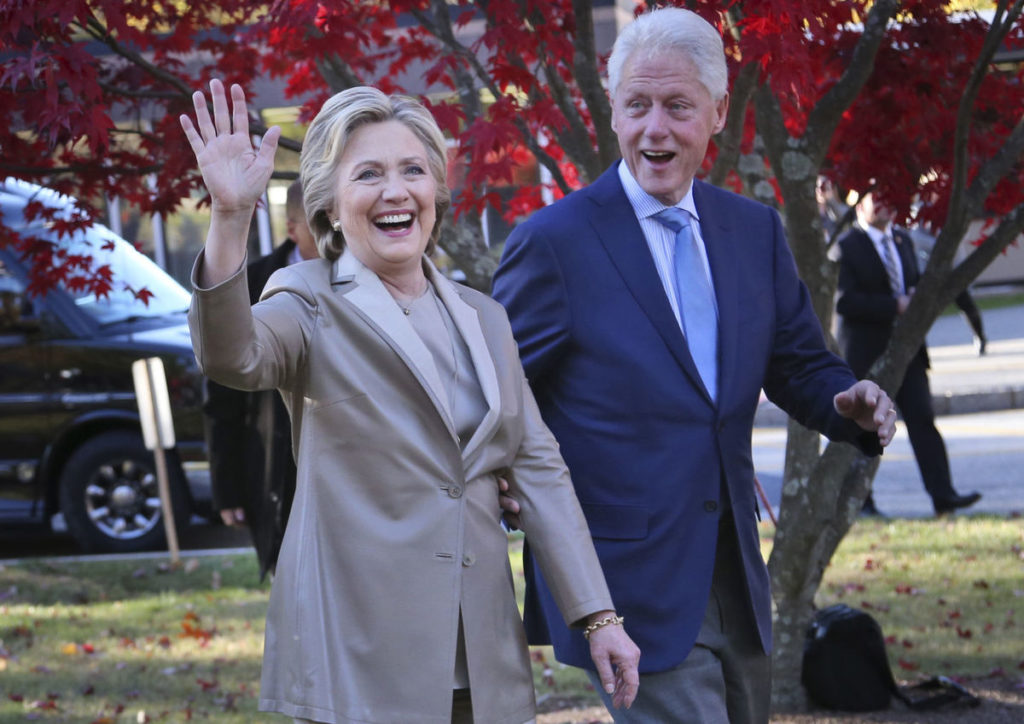
She’s delivered her closing pitch, concluded her final rally and cast her own vote. By Tuesday evening, there was little left for Hillary Clinton to do but wait, and prepare for word of whether she’d be picked as the first woman to serve as U.S. president. Her campaign picked a suitably symbolic location for her election night party – the Jacob K. Javits Convention Center in New York City, which, in a nod to the historic moment, offers a glass ceiling. As returns started trickling in Tuesday night, the Democratic nominee watched the information with a collection of close aides at the Peninsula New York, a luxury hotel nearby. The first round of poll closings came at 7 p.m. with Clinton taking Vermont and Trump winning Kentucky and Indiana. Those early wins were expected for both. Casting her ballot at an elementary school near her home in suburban New York on Tuesday morning, Clinton acknowledged the weight of the day, saying: ” so many people are counting on the outcome of this election.” It was a relatively calm Election Day compared with Clinton’s hectic final few days day on the campaign trail. The former secretary of state and New York senator dashed through battleground states, encouraged get-out-the-vote efforts and campaigned with a star-studded cast of celebrity supporters. The eve of the election included an emotional rally in Philadelphia with her husband, President Barack Obama and first lady Michelle Obama, as well as performances by Jon Bon Jovi and Bruce Springsteen. Lady Gaga capped it off by serenading thousands of supporters before the Clintons took the stage for a 1 a.m. rally in Raleigh, North Carolina. After the divisive rhetoric of the campaign against Republican Donald Trump, Clinton sought to offer a positive closing message on Monday. She told supporters in Pittsburgh they “can vote for a hopeful, inclusive, bighearted America.” In a buoyant mood, she also greeted voters who cried out “we love you,” smiling back: “I love you all, too … absolutely.” Some good news boosted Clinton’s spirits in the final moments of the campaign. On Sunday, FBI Director James Comey sent a letter to Congress, informing lawmakers the bureau had found no evidence in its hurried review of newly discovered emails to warrant criminal charges against Clinton. The late October announcement of a fresh email review rocked the race just as Clinton appeared to be pulling away from Trump in several battleground states. The update from the FBI may have come too late for some: In the nine days between Comey’s initial statement until his “all clear” announcement on Sunday, nearly 24 million people cast early ballots. That’s about 18 percent of the expected total votes for president. But campaign aides projected confidence in the final moments. They said they felt good about Nevada, where they said support for Clinton in early voting was strong. They were encouraged by the strong Latino turnout in Florida and felt they took a strong lead in Michigan and Pennsylvania into Election Day, when the bulk of votes are cast in those states. Leading up to Election Day, Clinton made stops in Pennsylvania, Michigan, North Carolina, Ohio and New Hampshire – often flanked by star guests. Jay Z and Beyonce performed with pant-suited backup dancers in Cleveland. James Taylor serenaded New Hampshire voters and Katy Perry sang “Roar” in Philadelphia. She also campaigned with Khizr Khan, the father of a slain U.S. Army officer whose indictment of Trump at the Democratic National Convention was an emotional high point for Clinton’s party. Her last two days on the campaign trail felt almost like a Clinton family reunion, with some of her closest confidants jumping on the campaign plane for her final hours. Even Huma Abedin, her embattled personal aide caught up in the email controversy, jumped on the plane for the midnight rally in Raleigh. Republished with permission of the Associated Press.
Senate control up for grabs as Democrats seek majority
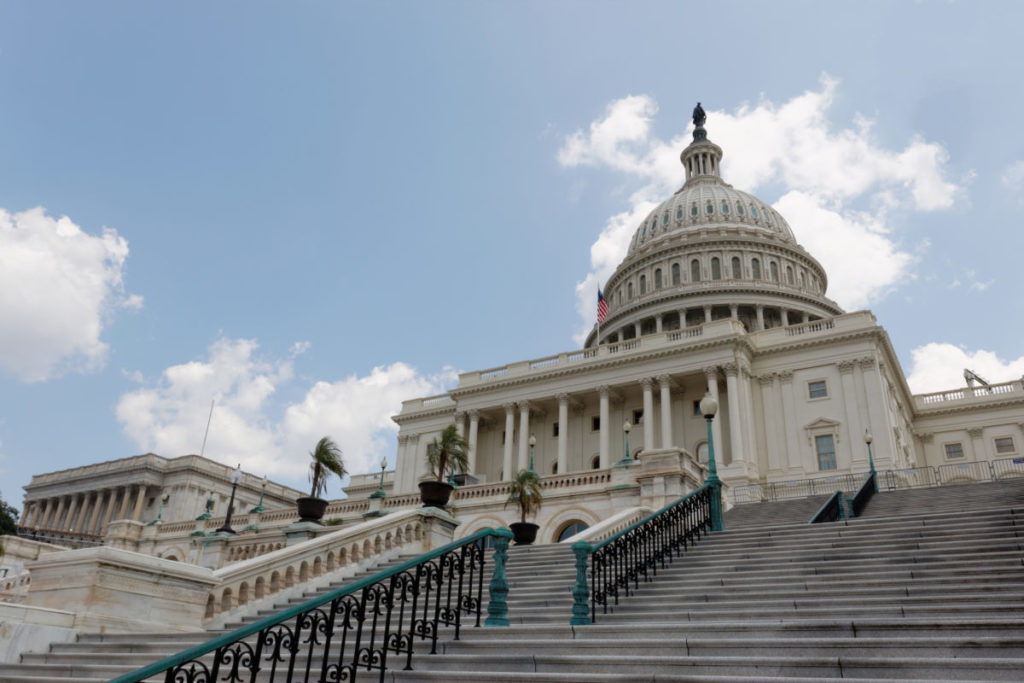
Control of the Senate was up for grabs Tuesday as Republicans’ hopes of protecting their narrow majority in an unpredictable election rested on a handful of states that were toss-ups until the end. GOP incumbents around the country faced energized Democratic challengers trying to oust them in costly and caustic battles shadowed every step of the way by the polarizing presidential race between Republican Donald Trump and Democrat Hillary Clinton. As the first polls closed Tuesday evening, Democratic Sen. Patrick Leahy of Vermont, the longest-serving sitting senator, was re-elected easily to an eighth term. In South Carolina and Kentucky, GOP Sens. Tim Scott and Rand Paul also won re-election as expected. But in GOP-held North Carolina, Missouri and New Hampshire, it looked like it could go either way as voting progressed. The races were also close in Pennsylvania, Indiana and Nevada, the one Democratic-held seat that was hotly contested this election. Republicans hold a 54-46 majority in the Senate, including two independent senators who caucus with the Democrats. That means Democrats need to pick up just four seats to take the majority if Clinton wins the White House and can send her vice president to cast tie-breaking votes in a 50-50 Senate. Democrats would need to pick up five seats if Trump wins. The GOP retook the majority just two years ago. And even though control of the Senate is likely to be razor-thin whichever party ends up on top, the advantages of being in the majority are significant. The controlling party holds the committee chairmanships, sets the legislative agenda and runs investigations. First up is likely to be a nominee to fill the vacancy on the Supreme Court. Democrats were counting on two likely pick-ups in Wisconsin and Illinois, though in Wisconsin polls tightened in recent weeks in favor of GOP Sen. Ron Johnson. Minority Leader Harry Reid of Nevada was retiring after five terms and trying to engineer a Democratic successor. Democrats were optimistic that a strong Latino vote, and Republican hopeful Rep. Joe Heck‘s stumbles with Trump, would keep Nevada in their column. In Florida, GOP Sen. Marco Rubio had a narrow lead in polling going into Election Day over Democratic Rep. Patrick Murphy, who was abandoned by his own party after Democratic bosses decided to pull ad money from expensive Florida and invest it in Missouri, North Carolina and Indiana, instead. But it was a different story in Indiana, where another star recruit, Evan Bayh, former Democratic governor and senator, was struggling in his comeback bid against Republican Rep. Todd Young. Ohio and Arizona, forecast to be competitive early on, were poised to be walks for the GOP incumbents, Rob Portman and John McCain. North Carolina and Missouri, on the other hand, were two GOP-friendly states that turned unexpectedly competitive as incumbent Republican Sens. Richard Burr and Roy Blunt seemed caught unawares by the nation’s restless mood. Throughout the campaign the Senate races provided moments of drama, not least as GOP candidates grappled with sharing a ticket with Trump. That tripped up Sen. Kelly Ayotte in New Hampshire after she asserted at one point that Trump could “absolutely” be a role model for the nation’s youth. Ayotte quickly retracted, then went on to renounce her endorsement of Trump after audio emerged last month of him boasting of getting away with groping women. But damage was done with GOP voters, and it didn’t stop Ayotte’s opponent, Democratic Gov. Maggie Hassan, from trying to tie Ayotte to Trump throughout the campaign. In Nevada, Heck un-endorsed Trump to boos after the groping audio, but later seemed to backtrack. He ended the campaign refusing to say whether or not he’d vote for Trump. Pennsylvania GOP Sen. Pat Toomey, too, kept voters in suspense until the 11th hour before saying he voted for Trump. There were poignant moments, too. McCain, at age 80, was seeking his sixth term in quite possibly his final campaign. The 2008 GOP presidential nominee struck a reflective note in a final pre-election rally in Prescott, Arizona, the same place his Senate predecessor, Barry Goldwater, began his Senate and presidential bids. “While as Yogi Berra said, ‘I hate to make predictions, especially about the future,’ I’m not sure how many more I have in me,” McCain said. “It’s fair to say, then, that tonight is very meaningful to me.” Republicans faced hurdles from the outset, starting with an unfavorable map that had the GOP defending 24 seats, including several in Democratic territory, compared to 10 for the Democrats. Republished with permission of the Associated Press.
Did you have any trouble voting? Let us know.

Did you experience any issues at your polling place? Alabama Today is tracking reports of problems or irregularities at polls across the state. The types of issues to report include long wait times, technical problems with machines, potential voter fraud, or requests for information you don’t think you should have to provide. Voters should also report issues to the Secretary of State’s office here. Simply fill out the form below. We will be tracking issues and finding answers when possible. (Click here if the form does not display properly on your device.) Loading… Polls in Alabama will be open statewide from 7 a.m. until 7 p.m.
The Latest: Republicans confident Trump will win Alabama

The Latest on Alabama elections (all times local): 8:25 a.m. Voting is underway in Alabama and Republicans are confident that Donald Trump will win the state. Democrat Hillary Clinton and Trump both visited Alabama during their respective primary battles, but both candidates have concentrated their efforts on battleground states. Secretary of State John Merrill has predicted a record number of voters will cast ballots Tuesday after voter registration hit a record high of 3.3 million. None of Alabama’s four U.S. House races or the lone Senate race on the ballot are expected to be very close given the name recognition and vast amounts of campaign money available to the Republican incumbents. Alabama voters also face 14 amendments that will affect everything from state parks to the age of public officeholders to beer. The polls will remain open until 7 p.m. 2:58 a.m. Donald Trump is expected to win Alabama, which has gone Republican in every presidential election since voting for Jimmy Carter in 1976. Republicans are confident in the deeply red state as polls open Tuesday. Democrat Hillary Clinton and Trump both visited Alabama during their respective primary battles, but both candidates have concentrated their efforts on battleground states since securing their respective party nominations. Following in their paths, volunteers from both parties have been dispatched to campaign in neighboring Florida where the race is considerably tighter. Secretary of State John Merrill has predicted a record number of voters will cast ballots Tuesday after voter registration hit a record high of 3.3 million. Polls are open Tuesday from 7 a.m. until 7 p.m. Republished with permission of the Associated Press.
Lines at voting precincts as polls open in Alabama
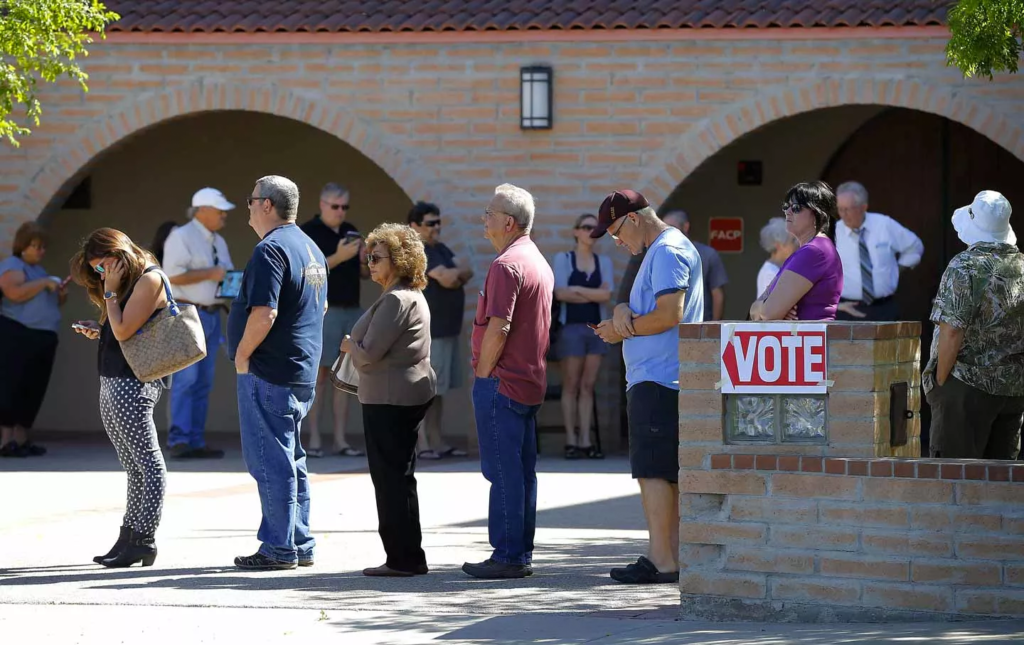
Lines stretched across fields and parking lots as polls opened in Alabama on Election Day. Officials are expecting big crowds after a rough-and-tumble presidential race, and those early predictions looked accurate. Rain won’t be a deterrent to potential voters, as forecasters predicted another dry day Tuesday amid a drought that has parched the state. Republican Donald Trump is a heavy favorite to carry the state over Democrat Hillary Clinton in the race for the White House, but other races and issues also will be decided. The ballot includes four U.S. House seats plus a U.S. Senate race, and voters will decide 14 statewide amendments. Here is a glance at some of the issues and questions on Election Day 2016 in Alabama: — HISTORY ON TRUMP’S SIDE Trump will carry Alabama over Clinton without a struggle if history and past voting patterns are an indication. Georgia peanut farmer-turned governor Jimmy Carter was the last Democrat to carry Alabama in a presidential election, and that happened in 1976. No Democrat has come very close since then to winning the state’s nine electoral votes, and the trend is getting worse for the party. Democratic presidential candidates have been stuck below 40 percent of the total vote in Alabama since 2000, when Tennessean Al Gore took nearly 42 percent of the vote compared to Republican George W. Bush. It will be interesting to see how Clinton fares compared to Democratic President Barack Obama, who carried 38 percent of the vote and lost Alabama by 22 percentage points to Republican Mitt Romney in 2012. — WHERE DO I VOTE? State election officials are predicting a possible record turnout by Alabama’s 3.3 million registered voters, but what if people are unsure where to vote? A phone call or a few mouse clicks can clear up that confusion. Voters who aren’t sure where to go on Election Day can call their county registrar’s office — the numbers are in the phone book, and most if not all are available online for Alabama’s 67 counties. For people with internet access, the website alabamavotes.gov may be a better solution. The site is operated by the secretary of state’s office. Residents can verify their registration to vote with a simple search at alabamavotes.gov, and another search pulls up information about voting precincts including addresses and polling times. At the same site, search panes also are available to view sample ballots for each county and to check the status of provisional and absentee ballots. — EYE ON VOTER INTIMIDATION Alabama’s top election agency said it won’t tolerate any attempts to intimidate voters on Election Day. A statement from the secretary of state’s office says anyone caught trying to dissuade others from voting on Tuesday will be prosecuted. Both Republican and Democratic campaigns often have volunteers serving as poll watchers. The statement from the secretary of state says poll watchers can’t disturb voters, try to influence them, campaign, or display any campaign material inside the polling place. Polls were open statewide from 7 a.m. until 7 p.m. — PHOTO ID REQUIRED This year marks the first time Alabama’s Republican-backed law requiring photo identification at the polls comes into play during a presidential election. Alabama requires voters to show photo ID such as a driver’s license, a passport, an Alabama non-driver ID, a university student ID or identification issued by the federal government. Voters without ID can still vote by regular ballot if they are positively identified by at least two election workers as being eligible to vote in a precinct. And voters who don’t have a valid ID will still be able to cast a provisional ballot. — CONSTITUTIONAL AMENDMENTS There’s a lot of fine print on Alabama ballots, and most of it spells out 14 statewide proposals to amend the state’s 1901 Constitution. The outcome will affect everything from state parks to the age of public officeholders to beer. Four of the amendments apply only to single counties. Here is a look at some of the other measures that have gotten the most attention: Amendment 2 aims to protect money for state parks and open the door to private companies getting more involved in park operations. The proposal specifies that park money can’t be diverted to other government functions unless revenues exceed $50 million. It would also allow private entities to run facilities at state parks. Amendment 8 guarantees that everyone has a right to work in the state regardless of whether they’re in a labor union. It mimics a state law already on the books. Amendment 13 would eliminate maximum-age limits for elected or appointed office with the exception of judicial offices. Trustees at public universities would be most likely to be affected. Amendment 14 would prevent hundreds of local laws — from sales taxes to draft beer rules — from being tossed out because of a dispute over legislative procedures in Montgomery. — CONGRESSIONAL RACES None of Alabama’s four U.S. House races nor the lone Senate race on the ballot is expected to be very close given the name recognition and vast amounts of campaign money available to the Republican incumbents, but there could be an exception. In the 2nd District of southeast Alabama, Rep. Martha Roby has faced a backlash by Trump supporters since publicly stating she wouldn’t support the GOP nominee because of his recorded comments about grabbing women. Democrat Nathan Mathis is hoping to capitalize on that dynamic, and Tea Party organizer Becky Gerritson is being promoted as a write-in candidate. On the Senate side, Republican incumbent Richard Shelby isn’t likely to have much problem against Democratic challenger Ron Crumpton, who is best known as an advocate for legalizing medicinal marijuana in the conservative state. Republished with permission of the Associated Press.


